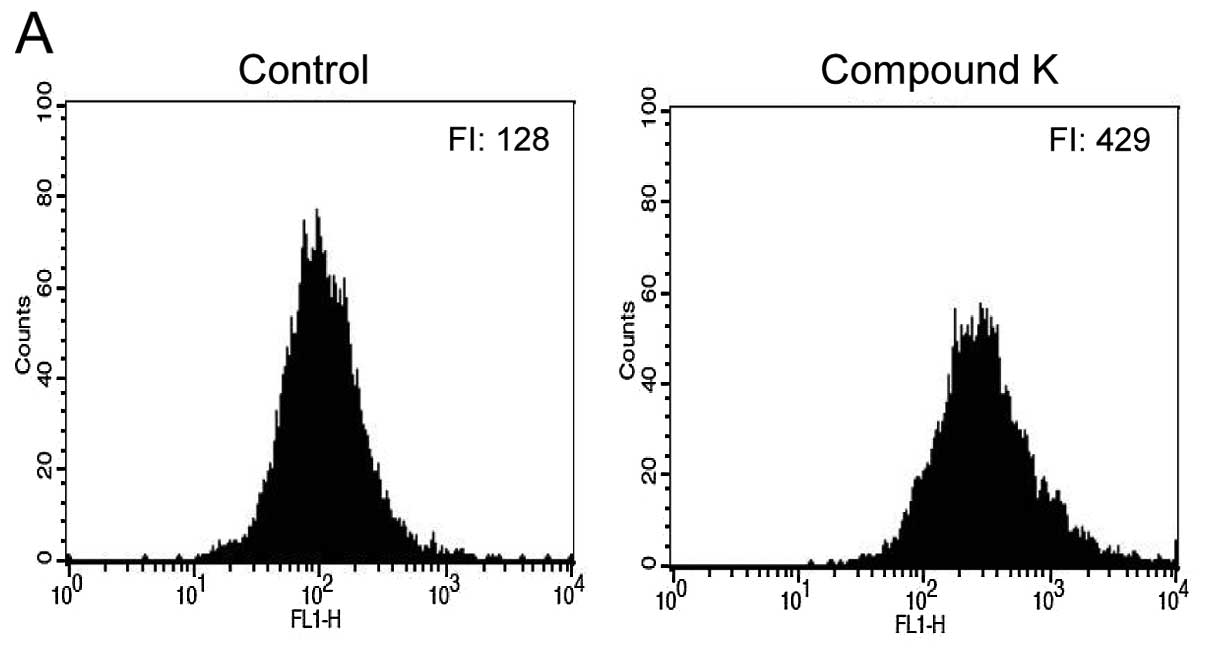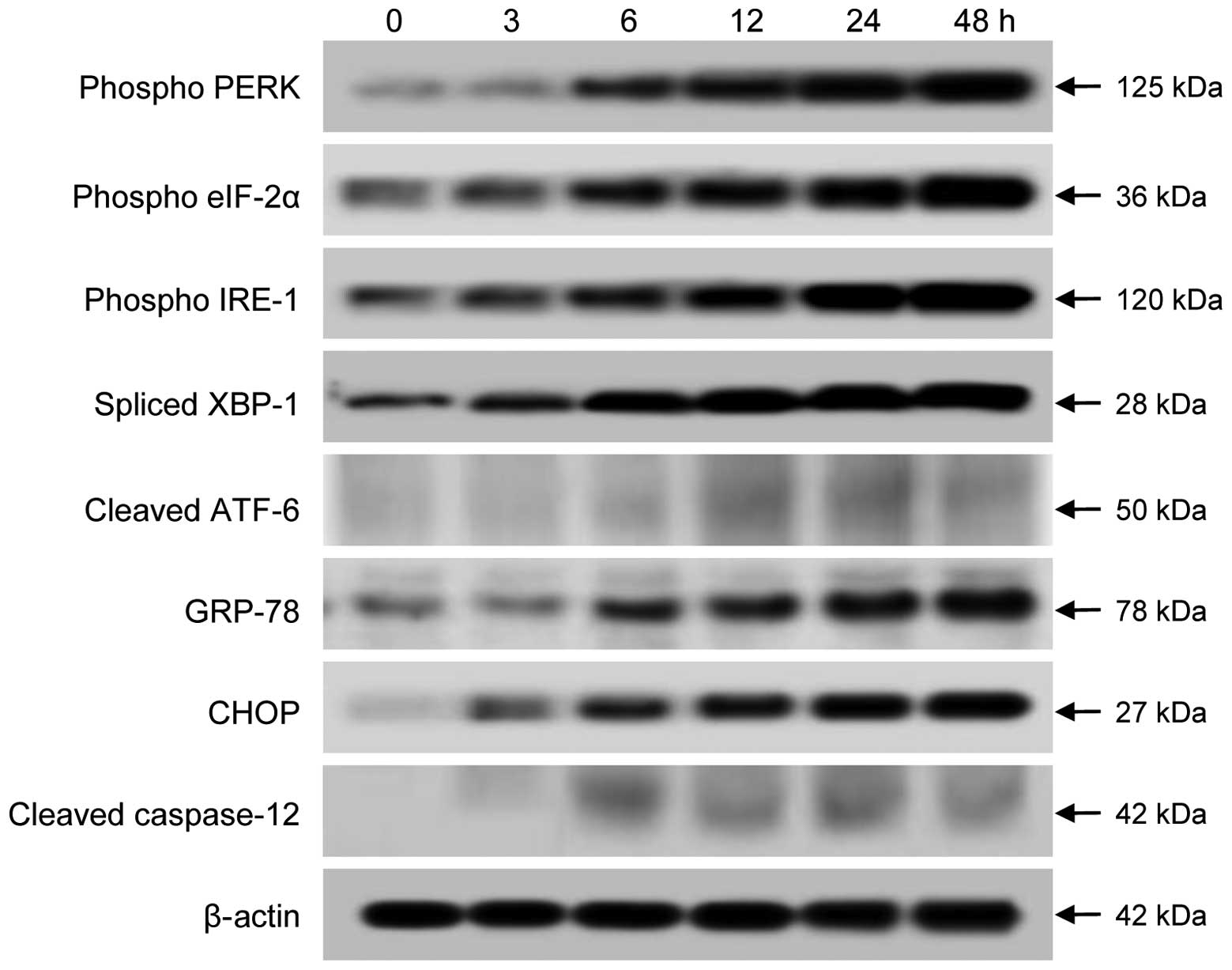|
1
|
Ilieva EV, Kichev A, Naudi A, Ferrer I,
Pamplona R and Portero-Otin M: Mitochondrial dysfunction and
oxidative and endoplasmic reticulum stress in argyrophilic grain
disease. J Neuropathol Exp Neurol. 70:253–263. 2011. View Article : Google Scholar : PubMed/NCBI
|
|
2
|
Dolai S, Pal S, Yadav RK and Adak S:
Endoplasmic reticulum stress-induced apoptosis in Leishmania
through Ca2+-dependent and caspase-independent
mechanism. J Biol Chem. 286:13638–13646. 2011. View Article : Google Scholar : PubMed/NCBI
|
|
3
|
Song HS, Kim HM, Jung SK and Lee DH:
Characterization of tunicamycin as anti-obesity agent. Biomol Ther.
17:162–167. 2009. View Article : Google Scholar
|
|
4
|
Yoshida H: ER stress and diseases. FEBS J.
274:630–658. 2007. View Article : Google Scholar
|
|
5
|
Szegezdi E, Logue SE, Gorman AM and Samali
A: Mediators of endoplasmic reticulum stress-induced apoptosis.
EMBO Rep. 7:880–885. 2006. View Article : Google Scholar : PubMed/NCBI
|
|
6
|
Vattem KM and Wek RC: Reinitiation
involving upstream ORFs regulates ATF4 mRNA translation in
mammalian cells. Proc Natl Acad Sci USA. 101:11269–11274. 2004.
View Article : Google Scholar : PubMed/NCBI
|
|
7
|
Ma K, Vattem KM and Wek RC: Dimerization
and release of molecular chaperone inhibition facilitate activation
of eukaryotic initiation factor-2 kinase in response to endoplasmic
reticulum stress. J Biol Chem. 277:18728–18735. 2002. View Article : Google Scholar
|
|
8
|
Calfon M, Zeng H, Urano F, et al: IRE1
couples endoplasmic reticulum load to secretory capacity by
processing the XBP-1 mRNA. Nature. 415:92–96. 2002. View Article : Google Scholar : PubMed/NCBI
|
|
9
|
Kim R, Emi M, Tanabe K and Murakami S:
Role of the unfolded protein response in cell death. Apoptosis.
11:5–13. 2006. View Article : Google Scholar : PubMed/NCBI
|
|
10
|
Okada T, Yoshida H, Akazawa R, Negishi M
and Mori K: Distinct roles of activating transcription factor 6
(ATF6) and double-stranded RNA-activated protein kinase-like
endoplasmic reticulum kinase (PERK) in transcription during the
mammalian unfolded protein response. Biochem J. 366:585–594. 2002.
View Article : Google Scholar
|
|
11
|
Wali VB, Bachawal SV and Sylvester PW:
Endoplasmic reticulum stress mediates gamma-tocotrienol-induced
apoptosis in mammary tumor cells. Apoptosis. 14:1366–1377. 2009.
View Article : Google Scholar : PubMed/NCBI
|
|
12
|
Nakagawa T, Zhu H, Morishima N, et al:
Caspase-12 mediates endoplasmic-reticulum-specific apoptosis and
cytotoxicity by amyloid-beta. Nature. 403:98–103. 2000. View Article : Google Scholar : PubMed/NCBI
|
|
13
|
Cordero MD, Sanchez-Alcazar JA,
Bautista-Ferrufino MR, et al: Acute oxidant damage promoted on
cancer cells by amitriptyline in comparison with some common
chemotherapeutic drugs. Anticancer Drugs. 21:932–944. 2010.
View Article : Google Scholar : PubMed/NCBI
|
|
14
|
Cvorovic J, Tramer F, Granzotto M,
Candussio L, Decorti G and Passamonti S: Oxidative stress-based
cytotoxicity of delphinidin and cyanidin in colon cancer cells.
Arch Biochem Biophys. 501:151–157. 2010. View Article : Google Scholar : PubMed/NCBI
|
|
15
|
Zhang R, Niu Y and Zhou Y: Increase the
cisplatin cytotoxicity and cisplatin-induced DNA damage in HepG2
cells by XRCC1 abrogation related mechanisms. Toxicol Lett.
192:108–114. 2010. View Article : Google Scholar : PubMed/NCBI
|
|
16
|
Roos WP and Kaina B: DNA damage-induced
cell death by apoptosis. Trends Mol Med. 12:440–450. 2006.
View Article : Google Scholar : PubMed/NCBI
|
|
17
|
Akao T, Kida H, Kanaoka M, Hattori M and
Kobashi K: Intestinal bacterial hydrolysis is required for the
appearance of compound K in rat plasma after oral administration of
ginsenoside Rb1 from Panax ginseng. J Pharm Pharmacol.
50:1155–1160. 1998. View Article : Google Scholar : PubMed/NCBI
|
|
18
|
Hasegawa H, Sung JH and Huh JH: Ginseng
intestinal bacterial metabolite IH901 as a new anti-metastatic
agent. Arch Pharm Res. 20:539–544. 1997. View Article : Google Scholar : PubMed/NCBI
|
|
19
|
Hasegawa H, Sung JH and Benno Y: Role of
human intestinal Prevotella oris in hydrolyzing ginseng saponins.
Planta Med. 63:436–440. 1997. View Article : Google Scholar : PubMed/NCBI
|
|
20
|
Akao T, Kanaoka M and Kobashi K:
Appearance of compound K, a major metabolite of ginsenoside Rb1 by
intestinal bacteria, in rat plasma after oral
administration-measurement of compound K by enzyme immunoassay.
Biol Pharm Bull. 21:245–249. 1998. View Article : Google Scholar : PubMed/NCBI
|
|
21
|
Kim HB, Kang CW, Kim BS, et al: Beneficial
role of ginseng saponin on hemodynamic functions of porcine blood
vessel. J Ginseng Res. 34:314–320. 2010. View Article : Google Scholar
|
|
22
|
Kim YS, Cho IH, Jeong MJ, et al:
Therapeutic effect of total ginseng saponin on skin wound healing.
J Ginseng Res. 35:360–367. 2011. View Article : Google Scholar : PubMed/NCBI
|
|
23
|
Chae S, Kang KA, Chang WY, et al: Effect
of compound K, a metabolite of ginseng saponin, combined with
gamma-ray radiation in human lung cancer cells in vitro and in
vivo. J Agric Food Chem. 57:5777–5782. 2009. View Article : Google Scholar : PubMed/NCBI
|
|
24
|
Lee IK, Kang KA, Lim CM, et al: Compound
K, a metabolite of ginseng saponin, induces mitochondria-dependent
and caspase-dependent apoptosis via the generation of reactive
oxygen species in human colon cancer cells. Int J Mol Sci.
11:4916–4931. 2010. View Article : Google Scholar
|
|
25
|
Kang KA, Lim HK, Kim SU, et al: Induction
of apoptosis by ginseng saponin metabolite in U937 human monocytic
leukemia cells. J Food Biochem. 29:27–40. 2005. View Article : Google Scholar
|
|
26
|
Kim AD, Kang KA, Zhang R, et al: Ginseng
saponin metabolite induces apoptosis in MCF-7 breast cancer cells
through the modulation of AMP-activated protein kinase. Environ
Toxicol Pharmacol. 30:134–140. 2010. View Article : Google Scholar : PubMed/NCBI
|
|
27
|
Choo MK, Sakurai H, Kim DH and Saiki I: A
ginseng saponin metabolite suppresses tumor necrosis
factor-α-promoted metastasis by suppressing nuclear factor-κB
signaling in murine colon cancer cells. Oncol Rep. 19:595–600.
2008.PubMed/NCBI
|
|
28
|
Kim do Y, Yuan HD, Chung IK and Chung SH:
Compound K, intestinal metabolite of ginsenoside, attenuates
hepatic lipid accumulation via AMPK activation in human hepatoma
cells. J Agric Food Chem. 57:1532–1537. 2009.PubMed/NCBI
|
|
29
|
Kim do Y, Park MW, Yuan HD, Lee HJ, Kim SH
and Chung SH: Compound K induces apoptosis via CAMK-IV/AMPK
pathways in HT-29 colon cancer cells. J Agric Food Chem.
57:10573–10578. 2009.PubMed/NCBI
|
|
30
|
Nicoletti I, Migliorati G, Pagliacci MC,
Grignani F and Riccardi C: A rapid and simple method for measuring
thymocyte apoptosis by propidium iodide staining and flow
cytometry. J Immunol Methods. 139:271–279. 1991. View Article : Google Scholar : PubMed/NCBI
|
|
31
|
Hajnóczky G, Robb-Gaspers LD, Seitz MB and
Thomas AP: Decoding of cytosolic calcium oscillations in the
mitochondria. Cell. 82:415–424. 1995.PubMed/NCBI
|
|
32
|
Cullinan SB and Diehl JA: PERK-dependent
activation of Nrf2 contributes to redox homeostasis and cell
survival following endoplasmic reticulum stress. J Biol Chem.
279:20108–20117. 2004. View Article : Google Scholar : PubMed/NCBI
|
|
33
|
Cullinan SB and Diehl JA: Coordination of
ER and oxidative stress signaling: the PERK/Nrf2 signaling pathway.
Int J Biochem Cell Biol. 38:317–332. 2006. View Article : Google Scholar : PubMed/NCBI
|
|
34
|
Abdelrahim M, Newman K, Vanderlaag K,
Samudio I and Safe S: 3,3′-diindolylmethane (DIM) and its
derivatives induce apoptosis in pancreatic cancer cells through
endoplasmic reticulum stress-dependent upregulation of DR5.
Carcinogenesis. 27:717–728. 2006.
|
|
35
|
Jiang HY and Wek RC: Phosphorylation of
the alpha-subunit of the eukaryotic initiation factor-2 (eIF2alpha)
reduces protein synthesis and enhances apoptosis in response to
proteasome inhibition. J Biol Chem. 280:14189–14202. 2005.
View Article : Google Scholar
|
|
36
|
Moenner M, Pluquet O, Bouchecareilh M and
Chevet E: Integrated endoplasmic reticulum stress responses in
cancer. Cancer Res. 67:10631–10634. 2007. View Article : Google Scholar : PubMed/NCBI
|
|
37
|
Sriburi R, Jackowski S, Mori K and Brewer
JW: XBP1: a link between the unfolded protein response, lipid
biosynthesis, and biogenesis of the endoplasmic reticulum. J Cell
Biol. 167:35–41. 2004. View Article : Google Scholar : PubMed/NCBI
|
|
38
|
Oyadomari S and Mori M: Roles of
CHOP/GADD153 in endoplasmic reticulum stress. Cell Death Differ.
11:381–389. 2004. View Article : Google Scholar : PubMed/NCBI
|
|
39
|
Rao R, Nalluri S, Kolhe R, et al:
Treatment with panobinostat induces glucose-regulated protein 78
acetylation and endoplasmic reticulum stress in breast cancer
cells. Mol Cancer Ther. 9:942–952. 2010. View Article : Google Scholar : PubMed/NCBI
|
|
40
|
Ariyama Y, Tanaka Y, Shimizu H, et al: The
role of CHOP messenger RNA expression in the link between oxidative
stress and apoptosis. Metabolism. 57:1625–1635. 2008. View Article : Google Scholar : PubMed/NCBI
|
|
41
|
Boyce M and Yuan J: Cellular response to
endoplasmic reticulum stress: a matter of life or death. Cell Death
Differ. 13:363–373. 2006. View Article : Google Scholar : PubMed/NCBI
|
|
42
|
Xu C, Bailly-Maitre B and Reed JC:
Endoplasmic reticulum stress: cell life and death decisions. J Clin
Invest. 115:2656–2664. 2005. View Article : Google Scholar : PubMed/NCBI
|
|
43
|
Oyadomari S, Koizumi A, Takeda K, et al:
Targeted disruption of the Chop gene delays endoplasmic reticulum
stress-mediated diabetes. J Clin Invest. 109:525–532. 2002.
View Article : Google Scholar : PubMed/NCBI
|


















